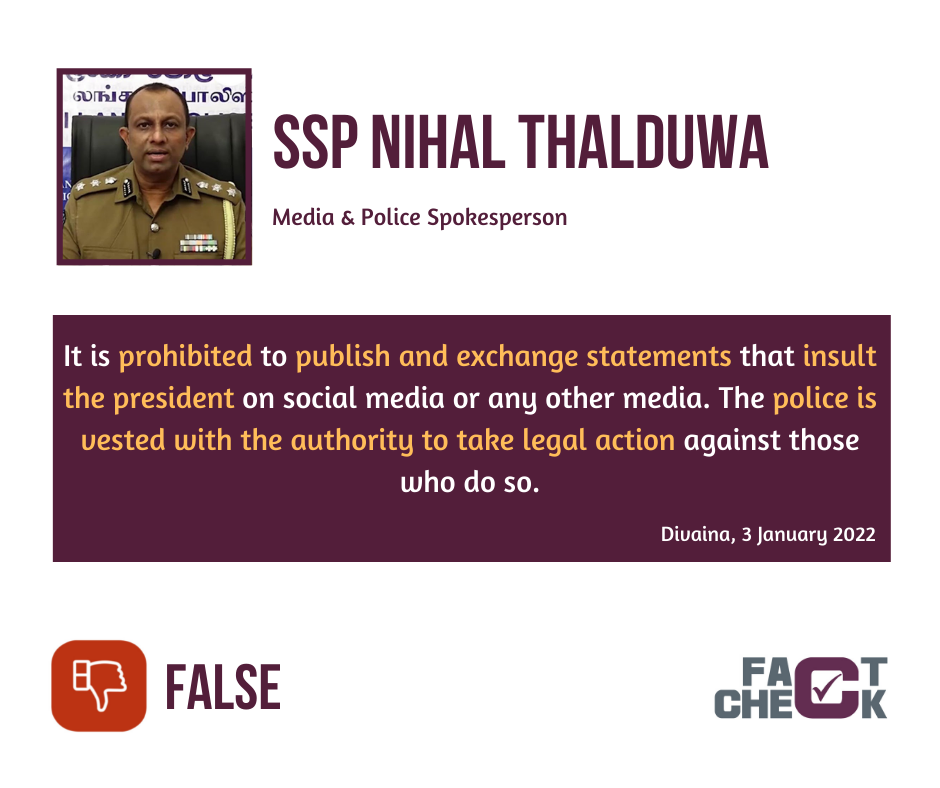“It is prohibited to publish and exchange statements that insult the president on social media or any other media. The police is vested with the authority to take legal action against those who do so.” – SSP Nihal Thalduwaග Media and Police Spokesperson (Divaina: 3 Jan 2022)
SSP Thalduwa made these claims to the media in relation to the incident where an activist was questioned by the CID for posting a video on social media of the public verbally protesting against President Gotabaya Rajapaksa as he was travelling through Mirihana. FactCheck.lk assessed these claims by analysing the provisions of the Constitution and judgments of the Supreme Court of Sri Lanka.
Article 14(1)(a) of the Constitution of Sri Lanka vests every citizen with the freedom of speech and expression. Under the Constitution, the freedom of expression can be restricted only by law for the protection of, among other things, national security, public order, racial and religious harmony, parliamentary privilege, or to prevent incitement to an offense.
The legality of publishing insulting statements against the president or government was dealt with in the 2015 judgement of the Supreme Court (SC) in Wahalathanthri v. Jayantha Wickramaratne, Inspector General of Police [S.C. (F.R.) Application No. 768/2009]. In this case, the police sought to prosecute two persons under Section 120 of the Penal Code for carrying harshly worded placards that protested the government. In its determination, the SC declared that the publication of defamatory, embarrassing, or insulting statements against the president or government is a lawful and democratic exercise of the freedom of expression. The SC also held that the police cannot prosecute members of the public for merely publishing defamatory, embarrassing, or insulting statements against the president or government, and that Section 120 of the Penal Code would apply only if such statements were intended to incite violence.
The above analysis confirms that publishing statements that merely insult or defame the president does not attract any criminal liability. As no criminal liability attaches to the making of statements that insult or defame the president, there is no lawful basis for the police to take legal action against persons who publish or exchange such statements. Therefore, we classify SSP Thalduwa’s statement as FALSE.
**FactCheck.lk’s verdict is based on the most recent information that is publicly accessible. As with every fact check, if new information becomes available, FactCheck.lk will revisit the assessment.
Sources
Amarathunga v. Sirimal [1993] 1 Sri L.R. 264 – https://www.lawnet.gov.lk/wp-content/uploads/2016/11/029-SLLR-SLLR-1993-1-AMARATUNGA-v.-SIRIMAL-AND-OTHERS-JANA-GHOSHA-CASE.pdf
The Constitution of Sri Lanka – https://www.parliament.lk/files/pdf/constitution.pdf
The Penal Code – https://ihl-databases.icrc.org/applic/ihl/ihl-nat.nsf/0/2962721b86fc380ac125767e00582c62/$FILE/Penal%20Code.pdf
Wahalathanthri v. Jayantha Wickramaratne, Inspector General of Police [S.C. (F.R.) Application No. 768/2009] – http://www.supremecourt.lk/images/documents/sc_fr_768_2009.pdf
